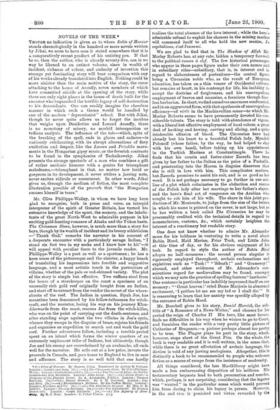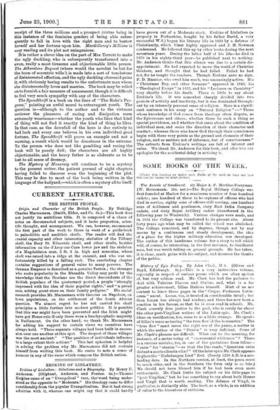NOVELS OF THE WEEK.• THOTYOR no indication is given as
to where Debts of Honour stands chronologically in the hundred or more novels written by Jokai, we seem to have seen it stated somewhere that it is a comparatively recent product of his untiring pen. If that be so, then the author, who is already seventy-five, can in no way be likened to an extinct volcano, since in wealth of incident, richness of colour, and audacity of invention this strange yet fascinating story will bear comparison with any of his works already translated into English. Nothing could be more sinister than the main motive of the story, the curse attaching to the house of Aronffy, seven members of which have committed suicide at the opening of the story, while there are only eight places in the house of death built for the ancestor who bequeathed the terrible•legacy of self-destruction to his descendants. One can readily imagine the cheerless manner in which such a theme would be handled by one of the modern " depressionist " school. But with J61-ai, though he never quite allows us to forget the incubus that weighs upon Desiderius and Lorand Aronffy, there is no monotony of misery, no morbid introspection or tedious analysis. The influence of the tale—which, spite of the breaking of the spell, ends in gloom and sadness—is curiously exhilarating, with its abrupt alternations of fiery exaltation and despair, like the Lassan and Frischka move- ments in the Hungarian gipsy music, or the feverish contrasts to be found in the symphonies of Tschaikowsky. Jokai presents the strange spectacle of a man who combines a gift of rather sardonic humour with a genius for triumphant melodrama;—trirunphant in that, no matter how lurid or gorgeous in its development, it never strikes a jarring note, never excites ridicule or resentment. In other words, Jokai gives us, through the medium of fiction, the most complete illustration possible of the proverb that the Hungarian amuses himself in tears."
Mr. Clive. Phillipps-Wolley, in whom we have long been glad to recognise, both in prose and verse, an intrepid interpreter of the spirit of Greater Britain, has turned his extensive knowledge of the sport, the scenery, and the inhabi- tants of the great North-West to admirable purpose in his exciting gold-hunting romance of Alaska and the Yukon basin. The Chicamon Stone, however, is much more than a story for boys, though by its wealth of incident and its breezy athleticism —" Thank God," remarks the narrator in his account of a desperate encounter with a particularly savage Indian, " I stand six feet two in my socks and I know how to hit"—it will appeal with peculiar force to the juvenile reader. Mr. Phillipps-Wolley is a poet as well as a sportsman ; he has a keen sense of the picturesque and the sinister, a happy knack of translating his impressions into forcible and suggestive language, and a most artistic touch in the portraiture of villains, whether of the pale or red-skinned variety. The plot of the story is simple but effective. Two ruffians steal from the house of a storekeeper on the coast a specimen of an unusually rich gold reef originally bought from an Indian, and start off to extract from the vendor the secret of the where- abouts of the reef. The Indian in question, Siyah Joe, has meantime been denounced by his fellow-tribesmen for witch- craft, and the narrator, losing his way on his journey Klon- dikewards from the coast, rescues Joe from the witch-killer, who was on the point of carrying out the death-sentence, and after standing siege against the two villains in Joe's eyrie, whence they escape in the disguise of bears, rejoins his friends and organises an expedition to search out and work the gold reef. Further adventures follow, including a terrible period spent on an island which forms the winter quarters of an extremely unpleasant tribe of Indians, but ultimately, though Joe and his enemy are overwhelmed by an avalanche, all ends well for the narrator. He sells out at a low price, invests the proceeds in Consols, and goes home to England to live in ease and affluence. The story is so well told that one hardly • (1.) Debts of Honour. By Mourns .T6kal. Translated by Arthur B. Yolland. London : Jerrold and Sons. [Cs.)—(2.) The Chicainon Stone. By Clive Phillipps- Wolley. London : Smith,Elderand Co. [Gs.)—(3.i TheShodoecofAitah. By Morley Roberts and Max Montesole. London : John Long. [6s.)—(4.) Robin Hood : a Romance of the English Forest. By A. Alexander, F.R.G.S. London : Thomas Burlelgh. [Ss.]—(5.) Daniel Herrick. By S. H. Burchell. London : Gay and Bird. [Ss.)—(G.).1facGilleroy's _Atli/ton& By Iza Duffus Hardy. London : Simpkin, Marshall, and Co. [6s.]—(7.) The Atherstone Bequest. By Mrs. C. R. Terrott. London : Thomas Burleigh. [6s.]—(8.) The :Spendthrift By Francis Dodsn•orth. London : Grant Richards. [Gs.]—(9.) The Mystery of Mtn- mtg. By R. J. Muir. London : T. Fisher Unn•in. [Cs.] realises the total absence of the love interest ; while the hero's admirable refusal to exploit his chances in the mining market will commend itself to all who hold the new maxim, Le capitalisme, c'est rennemi.
We are glad to find that in The Shadow of Allah Morley Roberts has, at any rate, bidden a temporary farewell to the political roman a clef. The few historical personages who appear in these pages figure under their own names and in subsidiary roles—subsidiary, that is, in interest and in regard to elaborateness of portraiture—the central figure being a Circassian noble who, as the result of European education, has taken on a thin veneer of Occidental culture, but remains at heart, in his contempt for life, his inability to accept the doctrine of forgiveness, and his unscrupulous employment of bravos and assassins, a ferocious though fear- less barbarian. In short, we find ourselves once more confronted, and in an aggravated form, with that apotheosis of unscrupulous efficiency—of virtit in the Machiavellian sense—to which Mr. Morley Roberts seems to have permanently devoted his con. siderable talents. The story is told with abundance of vigour, with a liberal but effective employment of local colour, a great deal of hacking and _hewing, carving and slicing, and a quite intolerable effusion of blood. The Circassian hero bad already lost his heart to a beautiful Polish lady, Myndell Polonoff (whose father, by the way, he had helped to slay with his own hand), before taking up his appointment in the Turkish Marines at Constantinople. There he finds that his cousin and foster-sister Zareefa has been given by her father to the Sultan as the price of a Pashalik, and penetrating into the Harem in disguise discovers that she is still in love with him. This complicates matters, but Zareefa promises to assist his suit, and is as good as her word. It is not perhaps necessary to go further in our out- line of a plot which culminates in the abduction and rescue of the Polish lady after her marriage to her father's slayer, and the hero's final act of vengeance on the Arabian who sought to rob him of his wife. The share in this joint pro- duction of Mr. Montesole, to judge from the size of the letters in which his name is printed on the cover, is not large, but as he has written a book called The Circassian he may be presumably credited with the technical details in regard to nomenclature, customs, &c., which certainly heighten the interest of a reactionary but readable story.
One does not know whether to admire Mr. Alexander more for his boldness in venturing to write a novel about Robin Hood, Maid Marian, Friar Tuck, and Little John at this • time of day, or for his obvious enjoyment of, his task. In regard to style the author of Robin Hood adopts no half -measures : the second person singular is rigorously employed throughout, archaic exclamations and expletives such as " Trish !" " 'Sdeath !" and " Gramercy!" abound, and other evidences of Mr. Alexander's con- scientious regard for medimvalism may be found, amongst which we may note the practice of spelling lantern" lanthorne." One sentence in particular has indelibly impressed itself on our memory : " Great heaven !' cried Dame Marjorie in abnormal excitement, I prithee let me see my lad or I shall die."' It is reassuring to learn that her anxiety was speedily allayed by the entrance of Robin Hood.
Mr. Birchen. gives to his story, Daniel Herrick, the sub- title of "A Romance of a News-Writer," and chooses for his period the reign of Charles II. His hero, like most heroes, finds no difficulties in his way when he wishes to go to Court, and furnishes the reader with a very pretty little picture of Catherine of Braganza,—a picture perhaps almost too pretty to be true. The Plague plays its part in the story, which, however, stops short of the Great Fire. On the whole, the book is very readable and it is well written, in the sense that, while there is no great affectation of archaic language, the diction is void of any jarring neologisms. Altogether, this is distinctly a book to be recommended to people who welcome fiction as a means of escape from the insistence of modernity.
All things considered, the late MacGilleroy might have made a less embarrassing disposition of his millions. His testamentary bequests lead to both personation and murder, which, perhaps, is not surprising, considering that the legatee was " wanted " in the particular sense which would prevent him. from daring to claim his legacy in person. However, in the end vice is punished and virtue rewarded by the receipt of the three millions and a prospect (virtue being in this instance of the feminine gender) of being able subse- quently to fall in love with the right man and to bestow herself and her fortune upon him. 3facGilleroy's Millions is easy reading and its plot not uningenious.
It is rather a clever idea on the part of Mrs. Terrott to make the ugly duckling, who is subsequently transformed into a swan, really a most tiresome and objectionable little person. The Atherstone Bequest (where would the novelist be but for the boon of eccentric wills !) is made into a sort of touchstone of disinterested affection, and the ugly duckling aforesaid gains it, with obviously boring results to the unfortunate man whom she disinterestedly loves and 'marries. The book may be relied onto furnish a fair measure of amusement, though it is difficult to feel very much sympathy with any of the characters.
The Spendthrift is a book on the lines of " The Rake's Pro- gress," pointing an awful moral to extravagant youth. The question is—although to the author and to the virtuous reviewer the pleasures of racing and dissipation seem extremely wearisome—whether the youth who likes that kind of thing will not find it exactly the kind of thing he likes. In that case, as the downfall of the hero is due entirely to bad luck and every one believes in his. own individual good fortune, The Spendthrift will prove an example and not a warning, a result which would be disastrous in the extreme. To the person who does not like gambling and racing the book will be purely dull; the characters are all highly objectionable, and the heavy father is so obdurate as to be lost to all sense of decency.
The Mystery of Muncraig will continue to be a mystery to the present writer, the patient perusal of eight chapters having failed to discover even the beginning of the plot. This may be due to moat of the book being written in the language of the kailyard,—which is often a mystery all to itself.



































 Previous page
Previous page